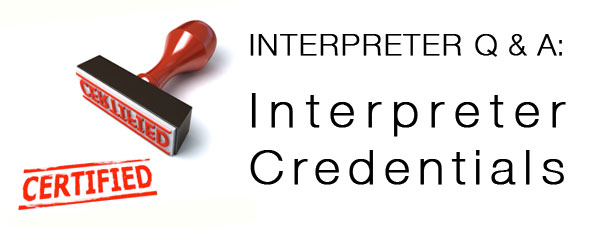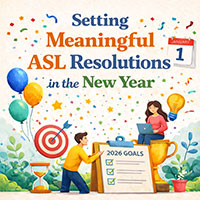
Interpreter Q & A: Interpreter Credentials
This article is part of our "Dear BC, Interpreter Q & A” series, which answers questions on interpreting and Deaf culture from multiple perspectives. There isn’t always one “right” answer to every question, and different people have different opinions on how to handle different scenarios. That is why more than one perspective is provided in this series, however, more opinions always exist. These perspectives are gathered from talking with experienced interpreters and deaf consumers from across the United States and Canada and do not solely come from the author.
It just so happens that I’ve been collecting interpreter business cards for a long time now and I’m convinced that anyone and everyone these days can call themselves an "interpreter" without any credentials to back up their claim. Truth be told, our consumers aren’t always familiar with all our acronyms and the terminology we use for certification levels, so they can be easily misled. Here are some examples of titles I have in my collection from non-certified "interpreters" out there:
- "ASL Interpreter"
- "State Certified Interpreter"
- "ITP Graduate"
- "Freelance Interpreter"
- "Interpreter for the Hearing Impaired" and my favorite… "Hearing Impaired Interpreter"… this was a hearing person!
Sincerely,
Concerned Interpreter
An Experienced Interpreter's Perspective:
"Consumer Beware!" That’s really what they should print on their business cards, although I doubt we will ever see it. One of the reasons I’m a strong proponent of licensing is the need to establish standards and ensure that only qualified people are practicing in the interpreting profession. Many hearing consumers and even some Deaf consumers don’t know what it takes to become qualified. As more states get on the bandwagon with licensure I believe this problem will start to disappear. In the meantime, we need to continue to educate consumers so they can make an informed choice when it comes to interpreting services.
Experienced Deaf Consumer's Perspective:
First of all, I would ask the interpreter if he or she has certification from the Registry of Interpreters for the Deaf (RID). If so, what kind of certification, and when? If he or she has no certification then I would ask where they got their training from and who their teachers were. If this person did not attend an interpreter training program, then I would discuss the importance of getting formal training, certification and state laws out there requiring it. If this person was assigned to me from an agency, I would inform his or her supervisor about my concerns and suggest they not utilize this person in the future.
ADVERTISEMENTS
 Brenda Cartwright is a Coda, seasoned interpreter, a master teacher, well known presenter, and author of several best selling sign language and interpreting textbooks from the RID Press. For 35 years Brenda was the Chair of the Sign Language Interpreter Program at Lansing Community College in Lansing, Michigan.
Brenda Cartwright is a Coda, seasoned interpreter, a master teacher, well known presenter, and author of several best selling sign language and interpreting textbooks from the RID Press. For 35 years Brenda was the Chair of the Sign Language Interpreter Program at Lansing Community College in Lansing, Michigan. Interpreter 4-1-1: Top 10 Pearls of Wisdom for Interpreters
Interpreter 4-1-1: Top 10 Pearls of Wisdom for Interpreters Interpreter Q & A: Is It Better to Be Late or Wet?
Interpreter Q & A: Is It Better to Be Late or Wet? Interpreter Q & A: Letting Interpreter Credentials Lapse
Interpreter Q & A: Letting Interpreter Credentials Lapse







Jillian @ Signing SavvyFriday, May 16, 2014
Thanks Brenda for the great article!